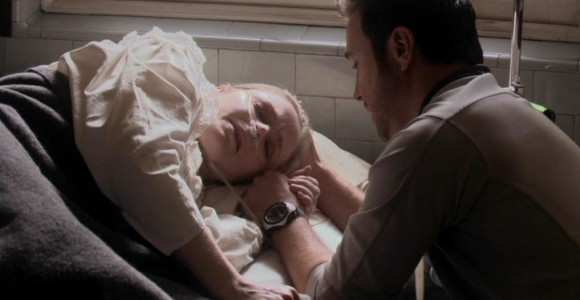Review
 EPISODE #107
EPISODE #107ORIGINAL AIR DATE: 08.20.2004
SYNDICATION AIR DATE: 10.31.2005
DVD DISC: Season 1, Disc 2
DIRECTED BY: Brad Turner
STORY BY: Mary Kaiser
TELEPLAY BY: Damian Kindler
Review by Taylor Brown
"Victory at all costs ... never thought I'd disagree."
- Dr. Carson Beckett
Much like last week's episode, "Poisoning the Well" is about what happens when the Atlantis team tries to help an alien civilization and instead wreaks havoc. The civilization is a little more advanced but the idea is the same, and I think "Poisoning the Well" carries it off a lot better.
"Poisoning the Well" is Damian Kindler's first Atlantis script, and let me say this first: I usually really enjoy the episodes he writes (with the exception of "Space Race," but let's not talk about that ... ever). So I was expecting something a little quirky and fun. The episode is more dramatic than I expected, but it's put together very well.
How does "Poisoning the Well" work better than "Childhood's End?" For one, the problem isn't nicely resolved in the nick of time, and our heroes are partially to blame. I was more impressed with this episode because the story is told in the context of one character's reaction. Teyla and Sheppard have their own parts in this episode with the stubborn chancellor, but it's through Dr. Beckett that we most clearly "see" the human side of the Hoffan civilization.
A lot of the burden of this episode thus falls on Paul McGillion. He plays the concerns of a medical professional very well, and his acting is impressive. Hopefully, we'll see more of this character, as he is already been in at least part of every episode. (Maybe it will be only a matter of time before he's a full-fledged regular!)
Dr. Beckett's attempt to increase the effectiveness of the serum, and the moral struggles of testing it on the sick man and their prisoner, provides a closer look into his character. It's against everything he believes as a doctor. And his reaction is heartbreaking as his worst fears come to life when half of the inoculated population dies.
"Poisoning the Well" also questions what allegiance the humans in Atlantis have to rules and regulations on Earth. As Weir points out, their experiment on "Steve" would be forbidden by the Geneva Convention, but she decides to go ahead with the test anyway. Are the special circumstances enough to allow them to break international laws? And what about these laws applying to their international contingent? This is a problem that's going to keep cropping up, and Weir's decision sets an important precedent.
Strangely enough, the main comic relief in this episode is Steve. Yes, I'm talking about the creepy Wraith that's been held prisoner in Atlantis for the past two episodes. Of course, Steve himself isn't the funny one -- it's the fact that they're calling a Wraith by such a name. I'm glad the sarcastic edge hasn't left Atlantis, as it's one of the reasons I was really drawn to the Stargate universe in the first place. Plus, we see another parallel between this show and Star Trek: Beckett is a cross between Dr. McCoy and Scotty.
There's just enough of this dry humor to balance out a very serious episode.
Again, it's the moral ambiguity that makes this episode so interesting, especially in the case of Steve. Early in the episode, Sheppard mentions that he doesn't pity Steve. But after he's hurt by the serum and Sheppard calls for help, Steve tells Sheppard not to pity him. It feels very strange for the Wraith to echo Sheppard's own words from earlier in the episode.
Another highlight of this episode is the direction, although it is subtle enough to not be distracting. The scenes with Sheppard and Steve framed with the bars of both the Atlantis holding area and the jail cell on Hoff, so it really looks like it's coming from one or another's point of view. However, with the great close up shots, I could have done without the overly long montage sequence. It doesn't show us anything that few lines of exposition couldn't, and I honestly have no idea what amount of time it was supposed to represent. Weeks? Months? Enough time for Sheppard to grow stubble?
As the team walks away from the Hoffan chancellor at the end of the episode, there is a sense of dramatic finality that wasn't there in "Childhood's End." It's an unhappy ending, but Beckett's last line packs a punch about not only the Hoffans, but the Atlantis team as well.
Rating: * * * 1/2



